Greek Translation

Are you looking for a regular or certified Greek translation? Look no further! Target Language Translation Services is at your disposal. Greece is a country full of mythology and ancient art. A translation is a work of art in its own right – professional, high quality, satisfying your requirements to the letter and always at the best possible price. Target Language Translation Services is proud to offer you regular and certified Greek translations from experienced Greek native speakers with an average of 5-10 years of experience offering professional translation services, who will provide you with exactly the right tone of voice your target group or line of business needs. Some examples of documents our regular and certified (or sworn) Greek linguists can translate from English or Dutch are birth certificates, criminal records, marriage certificates, diplomas, passports, manuals, etc. Please contact us to learn more and get a free quote.
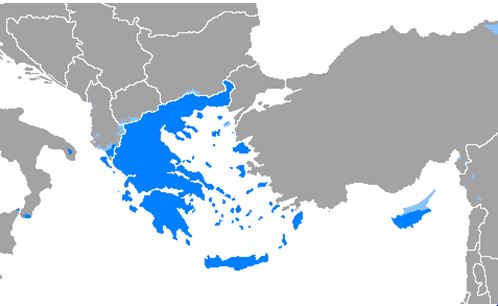
Areas where Modern Greek is spoken (in dark blue those areas where it is the official language).
About Greek
Greek belongs to the Hellenic branch of the Indo-European language family. It is spoken mainly in Greece and Cyprus, and also in Australia, Albania, Italy, Ukraine, Turkey, Romania and Hungary. It is an official language in Greece and Cyprus, and is recognized as a minority language Albania, Armenia, Hungary, Italy, Romania, Turkey and Ukraine.
In 2012 there were about 13.1 million speakers of Greek worldwide, including 10.7 million in Greece, 1.1 million in Cyprus, and 15,200 in Albania. There were about 238,000 Greek speakers in Australia in 2016, and in 1987 there were about 20,000 Greek speakers in Italy.
Written Greek
Greek was first written in Mycenae with a script known as Linear B, which was used between about 1500 and 1200 BC. This variety of Greek is known as Mycenaean. On Crete another script, known as the Cypriot syllabary, was used to write the local variety of Greek between about 1200 and 300 BC.
Greek alphabet (Ελληνικό αλφάβητο)
The Greek alphabet has been in continuous use since about 750 BC. It was developed from the Canaanite/Phoenician alphabet and the order and names of the letters are derived from Phoenician. The original Canaanite meanings of the letter names was lost when the alphabet was adapted for Greek. For example, alpha comes for the Canaanite aleph (ox) and beta from beth (house).
When the Greeks adapted the Phoenician alphabet to write their language they used five of the Phoenician consonants to represent vowel sounds: yodh [j] became Ι (iota), waw [w] became Υ (upsilon), 'aleph [ʔ] became Α (alpha), 'ayin [ʕ] became Ο (omicron), and he [h] became Ε (epsilon). New letters were also devised: Φ (phi), Χ (chi) and Ψ (psi). The result was the world's first fully phonemic alphabet which represented both consonant and vowel sounds.
At first, there were a number of different versions of the alphabet used in various different Greek cities. These local alphabets, known as epichoric, can be divided into three groups: green, blue and red. The blue group developed into the modern Greek alphabet, while the red group developed into the Etruscan alphabet, other alphabets of ancient Italy and eventually the Latin alphabet.
By the early 4th century BC, the epichoric alphabets were replaced by the eastern Ionic alphabet. The capital letters of the modern Greek alphabet are almost identical to those of the Ionic alphabet. The minuscule or lower case letters first appeared sometime after 800 AD and developed from the Byzantine minuscule script, which developed from cursive writing.
Today the Greek alphabet is used only to write Greek, however at various times in the past it has been used to write such languages as Lydian, Phrygian, Thracian, Gaulish, Hebrew, Arabic, Old Ossetic, Albanian, Turkish, Aromanian, Gagauz, Surguch and Urum.
Notable features
• Type of writing system: alphabet - the first one to include vowels.
• Direction of writing: Originally written horizontal lines either from right to left or alternating from right to left and left to right (boustrophedon/βουστροφηδόν). Around 500 BC the direction of writing changed to horizontal lines running from left to right.
• Diacritics to represent stress and breathings were added to the alphabet in around 200 BC. In 1982 the diacritics representing breathings, which were not widely used after 1976, were officially abolished by presidential decree.
• The letter sigma has a special form which is used when it appears at the end of a word.
• Used to write: Arvanitic, Cypriot Arabic, Greek, Griko, Karamanli Turkish, Tsakonian
Ancient Greek alphabet
This alphabet is based on inscriptions from Crete dated to about 800 BC. Greek was written mainly from right to left in horizontal lines at this time. It is uncertain what names were given to the letters, and some letters had more than one form.
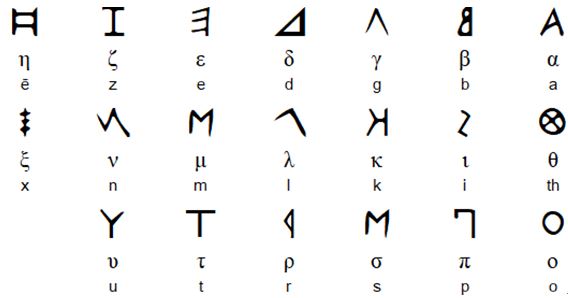
Greek alphabet (Classical Attic pronunciation)
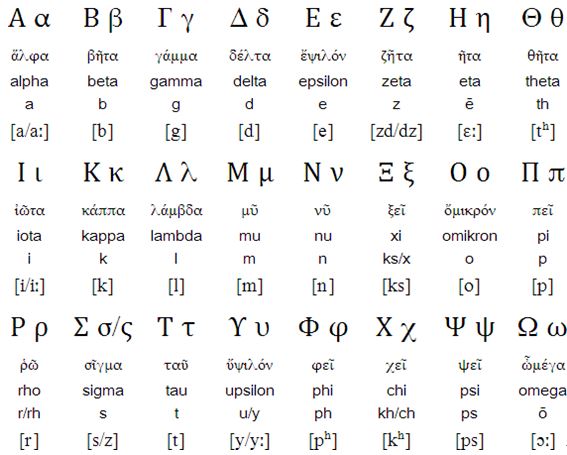
Note
• Σ = [z] before voiced consonants
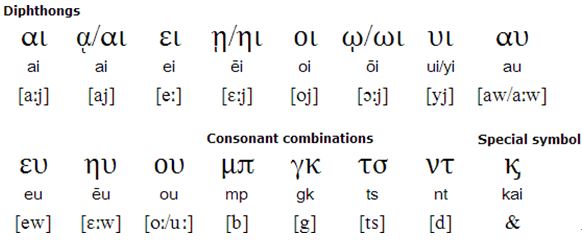
Archaic letters
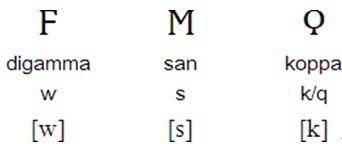
Greek numerals and
other symbols
The Ancient Greeks
had two numeric systems: the Acrophonic or Attic system used the letters iota,
delta, gamma, eta, nu and mu in various combinations. These letters were used
as they represented the first letters of the number names, with the exception
of iota: Γέντε (gente) for 5, which became Πέντε (pente); Δέκα (Deka) for 10, Ηἑκατόν
(Hektaton) for 100, Χίλιοι (Khilioi) for 1,000 and Μύριον (Myrion) for 10,000.
This system was used until the first century BC.
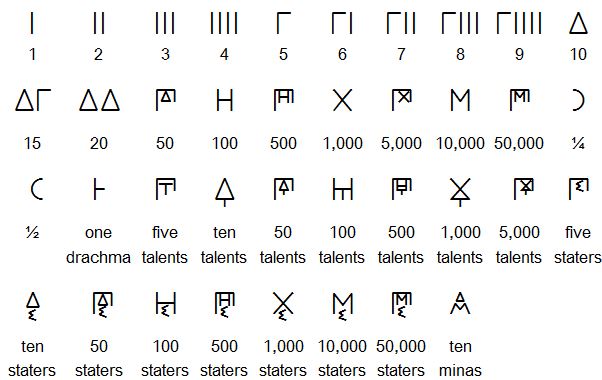
The Acrophonic
system was replaced by an alphabetic system that assigned numerical values to
all the letters of the alphabet. Three obsolete letters, digamma, koppa and
sampi, were used in addition to the standard Greek letters, and a apostrophe-like
numeral sign was used to indicate that letters were being used as numerals.
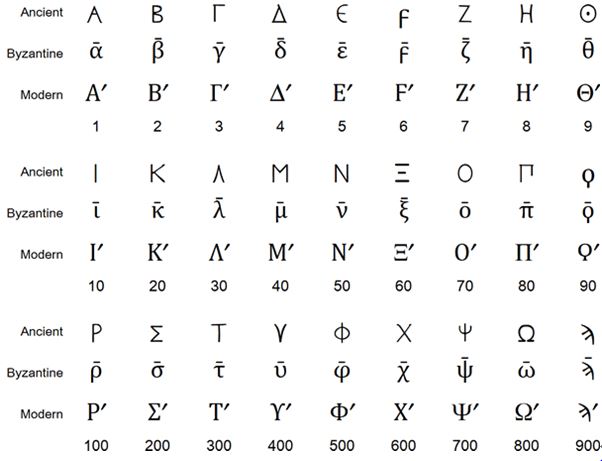
Greek alphabet (Modern pronunciation)
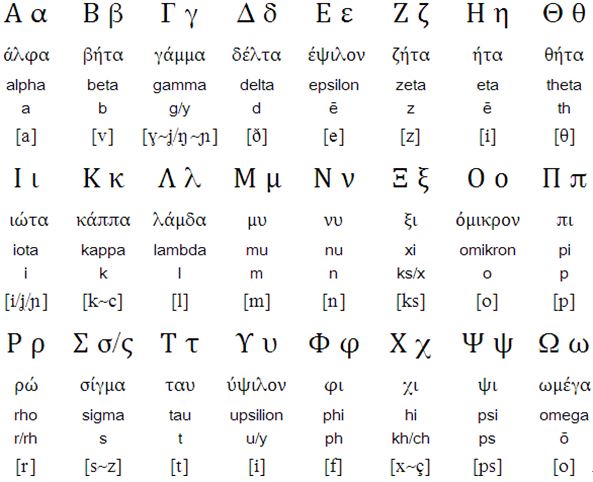
Notes
• Γ = [ɣ] before back vowels [a, o, u]. Before front vowels [e, i], it is pronounced [ʝ] and transliterated y
• Κ = [k] before back vowels [a, o, u], and [c] before front vowels [e, i]
• Λ = [ʎ] before an unstressed i followed by another vowel, e.g. λιώμα [ʎóma]
• Ν = [ɲ] before an unstressed i followed by another vowel, e.g. νιώθω [ɲóθo]
• When the sound [i] is preceded by a voiced consonant and followed by another vowel, it becomes [ʝ], e.g. διάκος [ðʝákos]. When it is preceded by a voiceless consonont and followed by another vowel it is pronounced as [ç], e.g. φωτιά [fotçá]. In both cases it is not stressed.
• Σ = [z] before voiced consonants
• Χ = [χ] before back vowels [a, o, u], and [ç] before front vowels [e, i]
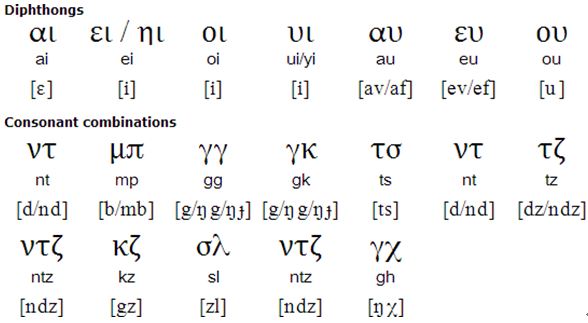
Notes
• αυ = [av] before vowels and voiced consonants; [af] elsewhere.
• ευ = [ev] before vowels and voiced consonants; [ef] elsewhere.
• ηυ = [iv] before vowels and voiced consonants; [if] elsewhere.
• ντ = [nd] in the middle of words; [d] at the beginning.
• μπ = [mb] in the middle of words; [b] at the beginning.
• γγ &γκ = [ŋg] in the middle of words; [g] at the beginning, unless followed by [i] or [e], when they are [ŋɟ] in the middle of words and [ɟ] at the beginning.
• A dieresis is used to indicate that vowels are pronounced separately, e.g. Αϊτή [aití]. However, when the first of the two letters is stressed, the dieresis sign is not necessary, e.g. γάιδαρος [γáiðaros].
• When κ, π, τ, ξ, ψ and τ&igma: are preceded by a word that ends in ν they become voiced and the final N turns into the corresponding nasal sound, e.g. τον πατέρα [tombatéra].
Did You Know?
Greek influence on English vocabulary
Many modern scientific and technical words in English and other Western languages are derived from Greek. It has been estimated that over 10% of English vocabulary is of Greek origin. Greek borrowings are too numerous to list here. Below are just a few examples of English words and roots borrowed from Greek.
English words from Greek
academy---Akademeia ‘grove of Akademos’, a legendary Athenian of the Trojan War tales on whose estate Plato taught his school.
alphabet---alphabetos, from alpha + beta, first two letters of the Greek alphabet
athlete---athletes ‘contestant in the games’, from athlein ‘to contest for a prize’
bishop---episkopos ‘watcher, overseer’, a title for government officials, later taken over in a Church sense, from epi– ‘over’ + skopos ‘watcher’
catholic---katholikos, from kata ‘about’ + genitive case of holos ‘whole’
cosmos---kosmos ‘orderly arrangement’
dinosaur---deinos ‘terrible’ + sauros ‘lizard’
diploma---diploma ‘license, chart’
drama---drama (genitive of dramatos) ‘play, action’ from dram ‘to act, perform’
exodus---exodus ‘ going out’, from ex– ‘out’ + hodos ‘way’
genesis ---genesis ‘origin, creation’
method---methodus ‘scientific method of inquiry’ from meta– ‘after’ + hodos ‘way’
metropolis---metropolis ‘mother city’ from meter ‘mother’ + polis ‘city’
monarchy---monarkhia ‘absolute rule’ from monos ‘alone’ + arkhein ‘to rule’
psalm---psalmos ‘song sung to a harp,’
rhythm ---rhythmos ‘measured flow, movement’
syntax---syntaxis ‘a putting together’ from syn– ‘together’ + tassein ‘arrange’
thesaurus---thesauros ‘treasury, storehouse’
hemi---hemi ‘half’
hetero---heteros ‘the other, another, different’
homo---homos ‘same’
-logy –logos ‘study of’
macro---makros ‘long, large’
mega---megas ‘great, large, mighty’
micro---mikros ‘small’
ortho---orthos ‘straight, true, correct, regular’
-philia---philia ‘affection’, from philos ‘loving’
-phobia –phobia, from phobos ‘fear’
photo---photos ‘light’
tele---tele ‘far off’
How much does a translation into Greek cost?
The standard rate for translations from English into Greek is $ 0.12. For urgent jobs that need several linguists working simultaneously, we will apply a surcharge.
Just contact us to get more information and a no-obligation quote. Our project managers can be reached via telephone, email, or the form. We look forward to serving you.
For more information about Greek Translation,
call us or add wechat today at +86-13616034782
or send us an email to:info@target-trans.com